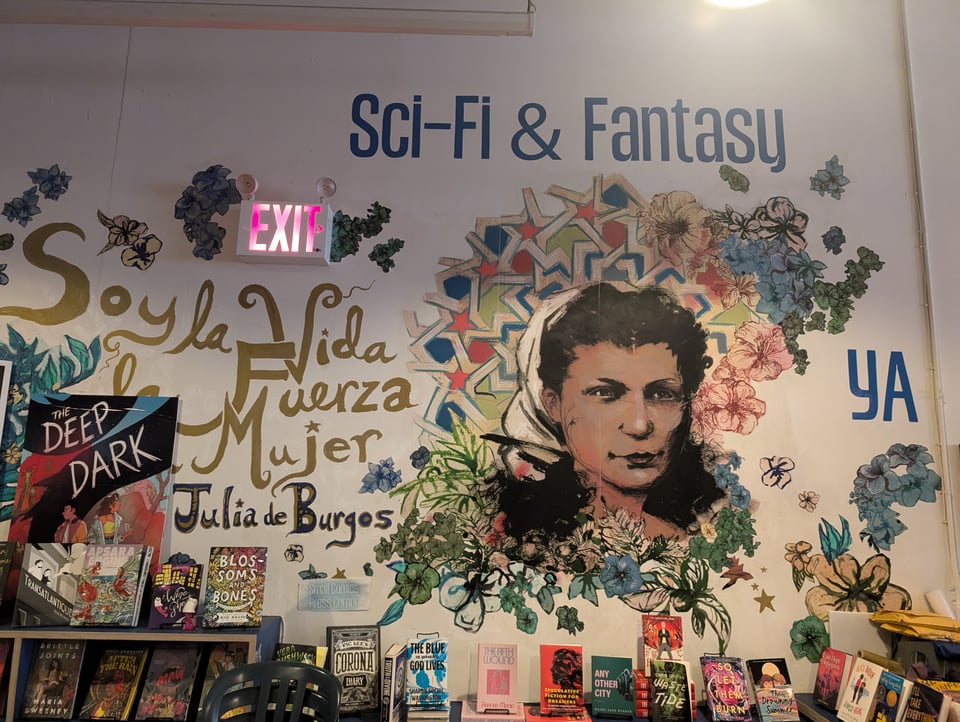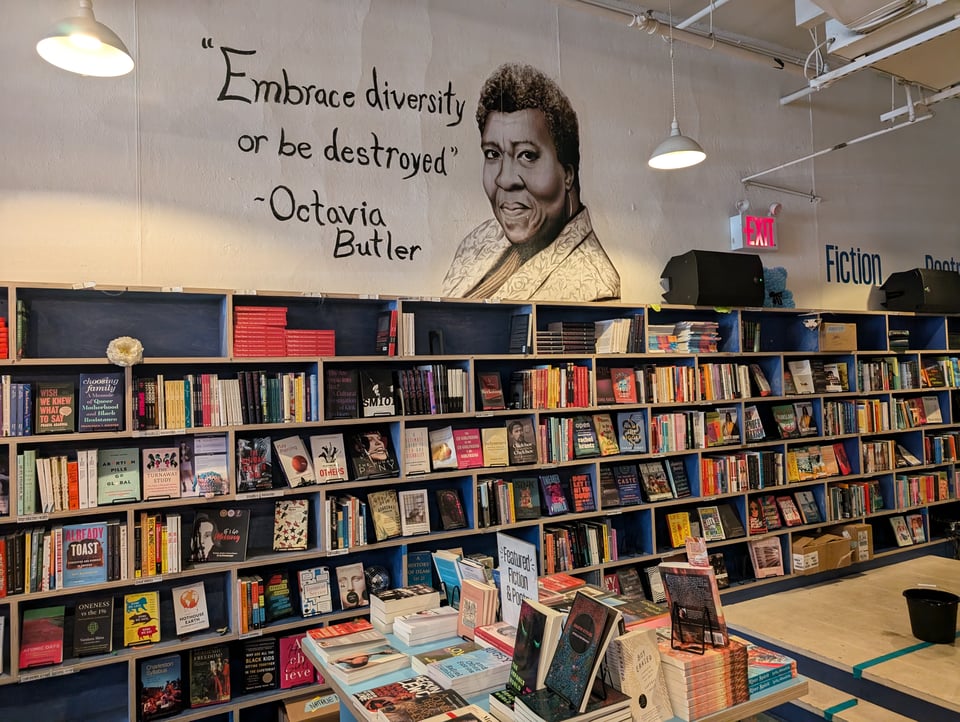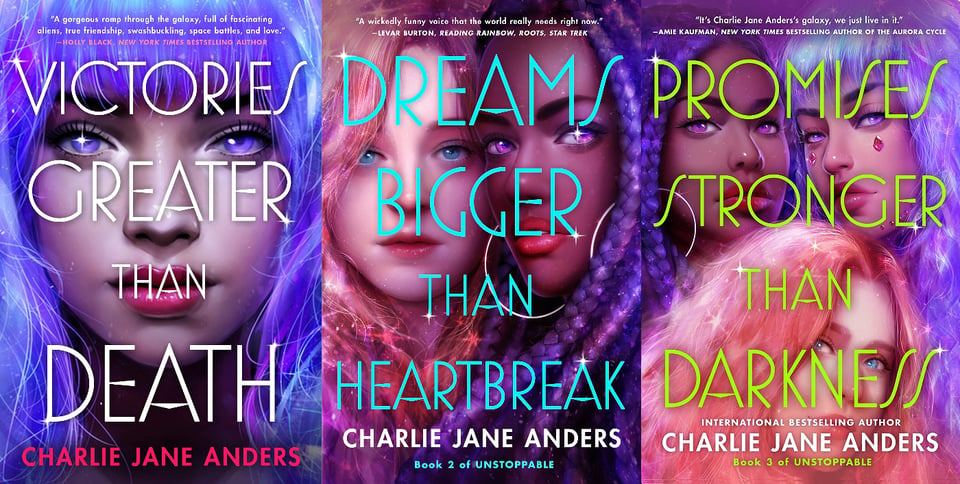Bluestockings Is Reinventing the Radical Bookstore. You Can Help!

I’ve written before about why bookstores are more than just excellent places to discover your new favorite author. They’re also community spaces and key parts of any good neighborhood. I got a new perspective on this last week, when I was lucky to visit an exhibition the NYU library called “Reading from Left to Left: Radical Bookstores in NYC, 1930-2000s,” which showed off the rich ecosystem of progressive, radical, queer and feminist bookstores in New York over the past ninety years. (I put a bunch of photos of the exhibit on my Instagram.) It was inspiring, but also sad — because what was once a wealth of radical spaces has now dwindled down to a few hold-outs.
So I was very overjoyed that a couple days after the exhibit, I had a meeting with Raquel Espasande, a worker-owner with Bluestockings Books. Bluestockings is a wonderful feminist bookstore in NYC’s Lower East Side, where I’ve done a couple of readings and book events over the years. Last December, I wrote a newsletter about an upsetting article: Bluestockings’ neighbors were trying to force the bookstore out of its new space, because the store welcomes unhoused people and provides free Narcan. I hadn’t read anything about what was going on with Bluestockings since late last year, so I wanted to check in, but also hear about all the ways that Bluestockings is becoming a better community space. And also, how you can support this awesome store.
Note: This interview has been condensed and cleaned up somewhat. Transcription by the incredible Keffy Kehrli.
What can you tell me about Bluestockings?
Bluestockings started in 1999 as a women’s bookstore and then throughout the years, it got queerer, and more radical, and trans-er. And now, twenty-five years later, we’re a worker-owned cooperative. And a community center for activists. We have a free store and an affiliated non-profit, and we also run an opioid overdose prevention program.
How long have you been involved with Bluestockings?
I’ve been here since 2019, and I’ve done a few different things. Right now, I’m the book buyer.
Were you there when it became a worker-owned cooperative?
Yes, over the pandemic. We used to be all volunteer-powered, which was a great model. But when the quarantine kicked in, people obviously had other things to attend to in their lives and so we used that time to regroup and restructure as a place where people can actually make a living. It was a struggle to see if it was even possible, because that is a big expense to take on. But, it’s 2024 now and we’re still going.
So Bluestockings seems different than most other indie bookstores nowadays. It's worker-owned, and it’s curated with more of a progressive bent. And it’s a community space. Are those the main differences you would point to?
Yes. We’re worker-owned, we make all decisions by consensus. Which doesn’t mean that we all always love every decision, but we all agree to it. And we care a lot about being a space that people can exist in without having to pay money, and being a part of the neighborhood and not just a stop here, a random physical location.
What does being part of the neighborhood mean to you?
The easiest answer is we don’t cater to just the people who have money in the neighborhood. We have been in the Lower East Side since 1999 -- we moved in 2020, but it was only a few blocks over. And so being a space where everyone who exists around and lives around feels welcome actually coming in and spending time has been sort of a guiding light for a lot of the events that we do.
A lot of our regulars who started becoming regulars because we have a free store, or because we have a bathroom that we don’t restrict access to, have then become regulars who also check out some of the books and sit down to read and come to events or perform their poetry at open mics.
And those include unhoused people but also just people who don’t have tons of money, in general?
Yeah, absolutely.
I feel like it’s a really underrated part of being a bookstore: being a community space and being part of the neighborhood.
Exactly. We’re not just trying to bring in an audience that already agrees with us or finds us online and comes through. Which is fine. We do get a lot of tourists who are like, “I looked up gay things to do in New York and I came by.” And I do love that. But also, [we cater to] the people who are already here.
This is just such a beautiful space. I love how airy it is. Do you have a lot of events in here? I saw you just hosted Adele Bertei.
Yes, and tonight we have a memoir by Alex DiFrancesco, I think, on transness, and Italian witchcraft. I’m very excited for that. We’ve been doing more and more music events as well, so we’ve updated our sound system a little bit to accomodate.

And we’ve also been doing a lot more book club sort of events where we don’t host it so much as people come in and use our cafe space to do anything from linoblock printing workshops to book clubs to unioinizing meetings. We do currently charge a fee for using the space, but it’s sliding scale. And if you’re launching a book and you have a marketing budget, would love for you to throw us some dollars. But if your event aligns with our values and you don’t have the money, please come in anyway.
Okay. Can we talk about the trouble with some of the neighbors and stuff? I read an article about it maybe four or five months ago, and I just wanted to make sure that everything was okay, because that was really scary.
It was, and we are still technically in negotiations with the landlord. They don’t really have any legal basis to evict us on, but we are technically still in negotiations.
Yeah, so some of the residential neighbors on the street noticed that we moved over here in 2020 and also noticed drug use went up in 2020 -- which is true on the level of this street, on the city level, on the state level, and country-wide.
And the world. There was a pandemic.
Yeah, 2020 was really bad. Opioid overdoses in just the city went up 75% from the previous year. And we didn’t cause that.
But we do offer help to people who might be at risk for those things. We have free fentanyl test strips and free Narcan, and we can train people on Narcan. And we have saved lives. But the residential neighbors on this street, particularly the newer ones who are paying higher rents, don’t really care and they are against being welcoming to the unhoused people in the community. Even those that have been here for over a decade.
Right.
So some of them decided to petition the city council to shut us down, which is not a power the city council has. They can’t just close a business because they don’t like it if we’re not breaking any laws, which we aren’t. I want to say that this is a very vocal minority of [our neighbors]. We did go door-to-door in the buildings around us and we had both a lot of support and a lot of people who were like, "I really don’t care either way." Which is fair.
But we did have a few who took it upon themselves to throw things out of their windows at our community, at us. Things had died down a little bit, I think, because of the article and because we did give some people’s full names to the press. And after the city council said this is not something we can really do, they kind of backed off a bit.
But, unfortunately, recently, last month, one of our most vocal harassing neighbors, who has been a nuisance for a while, yelling at us, slurs and things -- which we’re not super threatened by, to be honest -- but he did eventually escalate to coming in and assaulting one of my coworkers. And then when they defended themselves... or [simply] asked him to leave, he called the cops on my coworker.
Oh my God.
We’re not a space that calls cops. So it really just ensured that there was a police report about his own intent to assault us, through no intent of our own. But, yeah. That was pretty awful.
So there is still a little bit of that. And there was a woman, also last month, who came in to talk to me and was talking to me about like, “Oh, the free store programs and all this stuff that you do, like, thank you so much for it.” And I was like, "Oh, that’s so lovely. Yes, of course." And then she went on to be like, “I had to move because of you and now I’m renting out my apartment. And so I think that you should know that. Like, thank you.” I guess, sarcastically. And I...
She had to leave her home because you were giving free stuff to people?
Literally. And I was like, "Okay..."
There have been people who have claimed to the press that there was never drugs in the Lower East Side before us... which, if you know the most basic New York City history, is pretty laughable.
So it’s just mostly at the level of complaints and harassment, kind of.
Complaints and harassment, yes. And we share a landlord with the residents that live in apartments above us. So the landlord’s initial response was to try and evict us but we did retain pro bono counsel and they pointed out that we’re both not doing anything illegal or anything that violates our lease. So one of the stipulations they had was for us to stop giving out Narcan and free Fentanyl test strips because they consider that us being a medical facility, which isn’t true in any legal sense.
Narcan is as legal as Tums. It’s something that you can get completely over the counter. You don’t need a prescription, you don’t need a doctor involved, which is why we can give it out here through a state program. We get it from the state to give it out for free, and we’re all properly trained in dispensing it and in training others in how to use it. And also our lease states that we are a bookstore/cafe/community center. So we’re pretty well covered. We’ve never hid what we are and we’ve done this program for a while. Since, before being in this particular space.
So how can people support Bluestockings?
Well, obviously coming in and hanging out at any time. Come in, check out our books, buy our books, buy our coffee, all that good stuff. We do have an online store at Bluestockings.com, and we do ship everywhere in the world. And what is absolutely, by far the most helpful, the thing that pays our rent the most, is our member’s program. So we do have a monthly member’s program at withfriends.co/Bluestockings where people can sign up to pay a monthly amount for different perks.
It starts at $2 a month. And at $2 a month, you just get our undying gratitude. And then, at different tiers, you get free tote bags and buttons and things like that. At $30 a month, you can choose one of our book subscriptions, which means every month, you’ll get a book in the mail that is our monthly book that we’ve chosen for all of the book subscribers. And we have a few of those: children’s, teens, romance, poetry. The romance is always queer romance. And the main one, which is usually a fiction book that’s relatively recent and something that you would find on our shelves. Which is a nice way to boost authors that we think, "Hey, more people should be reading this."
So why do we need in-person spaces like Bluestockings, instead of just hanging out in queer and progressive spaces online? Or going to a bar?
Honestly, I do love the internet. I love an online space but I do think that the organic connections that happen in here, in this physical space rather than the organic ones online are less siloed echo chambers. There are just so many people who are drawn to here for completely different reasons who I then get to see interact and build community together. And then they are already living in the area, so it sort of spills out to other events that they then create around the city.
And it is just kind of this cross-cultural, cross-class-lines community in a way that I think is possible online but difficult, sometimes.
I’m obsessive about Times Square Red, Times Square Blue by Samuel R. Delany, particularly because he talks about porn theaters as being that. Like, there’s so many different people who were drawn to those [places]. I mean, particularly men. But, all types of men who then forged some real relationships that never would have been forged otherwise. And I definitely have friendships I’ve made here that are like... I don’t know where else I would have encountered them.
My Stuff
The latest episode of Our Opinions Are Correct is all about absurdism in speculative fiction, plus we interview Victor Manibo, author of the incredible Escape Velocity.
My novel Promises Stronger Than Darkness just won the Locus Award for best young adult novel! This means all three books in the Unstoppable trilogy have won the Locus Award for Best YA, which feels pretty incredible. The whole trilogy is out in paperback. Promises Stronger Than Darkness is also nominated for a Lodestar Award, so if you are a Hugo Awards voter, you can get the whole trilogy in your voter packet…

You can check out all my book review columns in the Washington Post.
I also have some other books! There’s New Mutants Vol. 4 and New Mutants: Lethal Legion. Not to mention my writing advice book Never Say You Can't Survive and my short story collection Even Greater Mistakes!
You can get signed and personalized copies of all my books from Green Apple Books in SF!